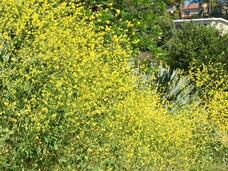 Luke 13: 18-19 He said therefore, “What is the kingdom of God like? And to what should I compare it? It is like a mustard seed that someone took and sowed in the garden; it grew and became a tree, and the birds of the air made nests in its branches.” Ahh the lowly mustard seed- the smallest of seeds which grows into the largest of "trees." Actually, it's more like a plant. Well, a bush. Oh, let's be honest, it's a weed. And yes, we get great little seeds from these weeds that make spicy brown, mild yellow, and dijon, but the weeds are unruly and invasive. There are global efforts even today, to control the prolific mustard weed, especially the particularly offensive, garlic mustard. (Did you even know there was such a thing? Who else feels like they are missing out on some secret condiment delicacy which sounds like it would be deliciously good on a salami and provolone sandwich?) Garlic mustard, "introduced from Europe as a food source is now a serious concern in forests across North America... an invasive non-native biennial herb that spreads by seed. ... The fact that it is self fertile means that one plant can occupy a site and produce a seed bank." "The roots exude a chemical that is inhibit other plants from growing, and it can grow in full sun or full shade, making it a threat to a wide variety of our native plants and habitats. Each plant can produce up to 5000 seeds which remain viable in the soil for five years or more."emswcd.org › on-your-land › weeds › weeds-to-know A parable is kind of like a riddle. We are meant to ponder it, work on it, pray and meditate with it. So instead of me explaining this one in the way God has revealed it to me, I want to leave this one with you to piece together, just as Jesus left it for his hearers. Here is hint, and a few questions to get you started. Hint: The wisdom of this parable is in the 'weediness.' The Kingdom of God is like a mustard seed that someone took and sowed... Questions: 1. What is the seed of the Kingdom of God, and who 'took and sowed' it? 2. How does the seed of the Kingdom of God spread like a mustard plant? (Each "plant" producing 5000 seeds or more?) 3. What "chemical" might our "roots" exude, and what might that "chemical" stop from growing around us? 4. How might our seeds be fertilized, nurtured, and grown "in sun or shade?" Why not leave a comment with what God reveals to you? #discipleshipishardwork Happy Parable-ing, Pastor Linda
2 Comments
Denise Benson
3/17/2021 12:46:15 pm
I have many different thoughts on what the seed of the Kingdom of God is and I'm not sure which is from God and which is from my human brain. Could the seed be The Good News, sown by Jesus and then the disciples and Apostle Paul and all the rest of us Christians? I believe it can also be Jesus, planted by God. A third thought I have is that the seed is love but I also believe love is the chemical exuded (see question 3). This question has stumped me and I can't stop thinking about it.
Reply
Pastor Linda
3/19/2021 04:37:04 pm
I like your take on this Denise- and your answers- and that you are continuing to think about it. That's what discipleship is, right? That we are continually growing and shaping to reflect more and more of God's love. That's beautiful!
Reply
Leave a Reply. |
Rev. Linda PepeLoving life, light, and laughter... Archives
April 2021
Categories |
 RSS Feed
RSS Feed
